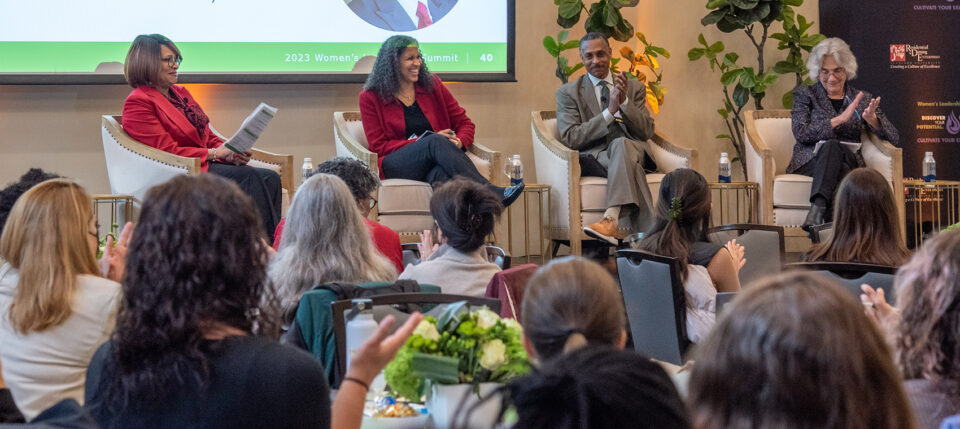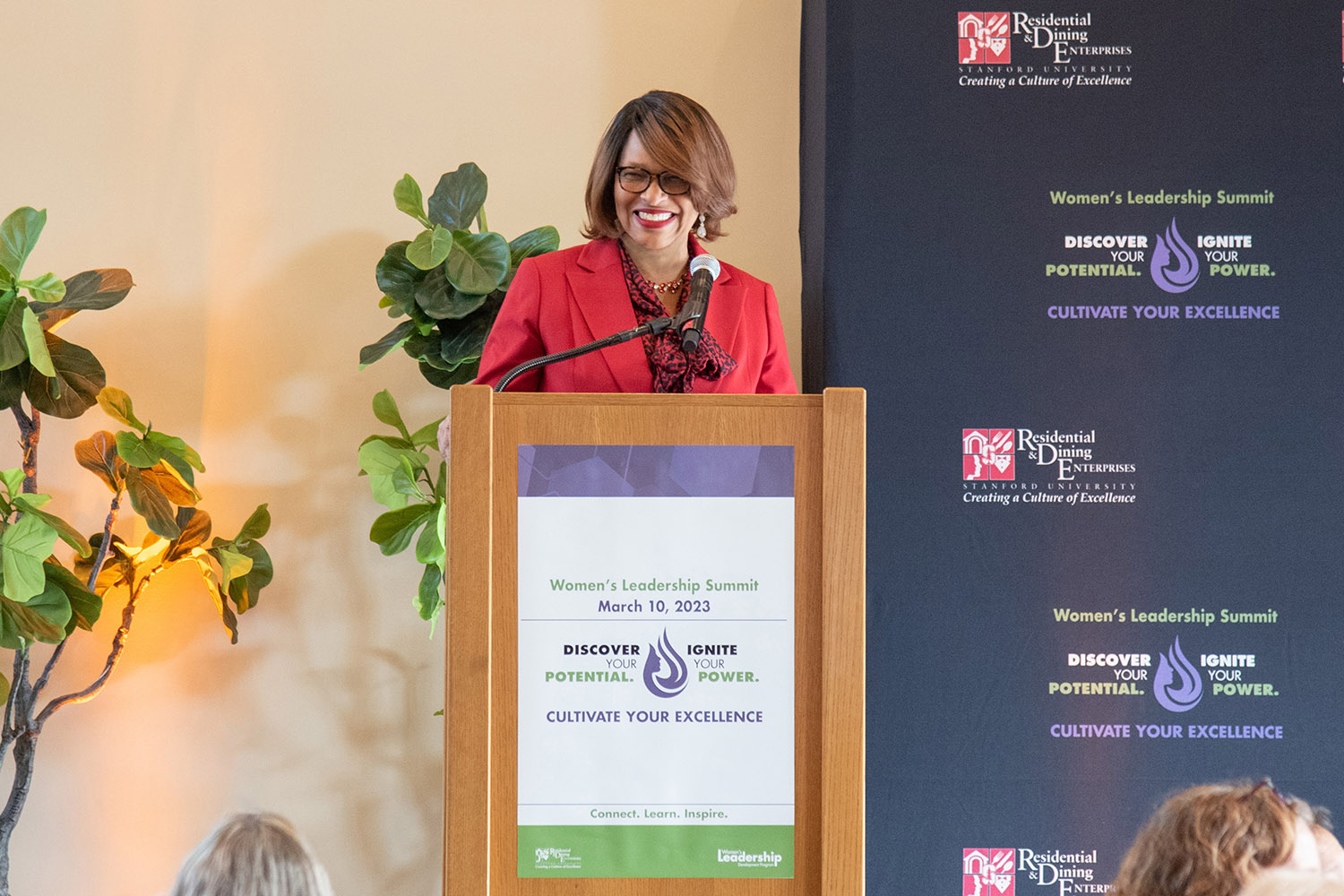Stanford Women’s Leadership Summit inspires attendees of all genders
More than 300 faculty, staff, and students gathered to build community and explore leadership, empowerment, DEIB, and the importance of strong mentorship and allies.
The 2023 Women’s Leadership Summit, created in partnership with the Residential & Dining Enterprises (R&DE) Women’s Leadership Development Program, was a day of learning and community-building that drew attendees from more than 40 departments across the university.
The March 10 summit featured presentations from R&DE and other Stanford leaders and industry experts, and was hosted by Shirley Everett, senior associate vice provost for Residential & Dining Enterprises and senior advisor to the provost on equity and inclusion. Everett established the Women’s Leadership Development Program in 2012 and founded the Women’s Leadership Summit in 2019 to provide professional development, mentorship, and empowerment to women leaders in culinary careers. Since then, her vision for the program has expanded to include employees of all genders and backgrounds in R&DE and at Stanford.
Throughout the day, in presentations, panel discussions, and breakout sessions inspired by the conference’s theme, “Discover Your Potential. Ignite Your Power. Cultivate Your Excellence,” speakers shared personal stories and lessons from their research and their lived experience to help individuals of all genders on their own leadership journeys.
‘We cannot do the work we do without each other’
In a hearty welcome, Everett shared her aspirations for the summit: “My hope is that we will be empowered to reach our leadership potential, look deep inside to discover our inner calling, our inner strengths, and identify ways to share our unique voice with the world. I want you to walk away with some tools to ensure that nothing is impossible for you.”
Speaking of Women’s History Month, she said, “I wanted to be sure that we are putting the issues women face in the forefront, because from history, we know that has not always been the case.” Though the summit was created primarily with women in mind, she emphasized the importance of people of all genders working together, “because we cannot do the work we do without each other.”
Everett shared her experience of leading while navigating the difficult terrain of the COVID-19 pandemic. Of the many challenges she faced, she said, her top priorities were the health, safety, and financial well-being of students and R&DE employees, and the completion of the Escondido Village Graduate Residences (EVGR), the residential complex of four 10-story buildings housing 2,400 graduate students.
She spoke to the need for strong leaders to show courage and compassion. “I needed to make sure I advocated for all of my team to remain employed, even though hundreds of millions of dollars of room and board revenue walked out the door when most of our undergraduate students were sent home,” she said. “I redeployed staff to other roles throughout R&DE and many of them had the opportunity to learn new skills as a result.”
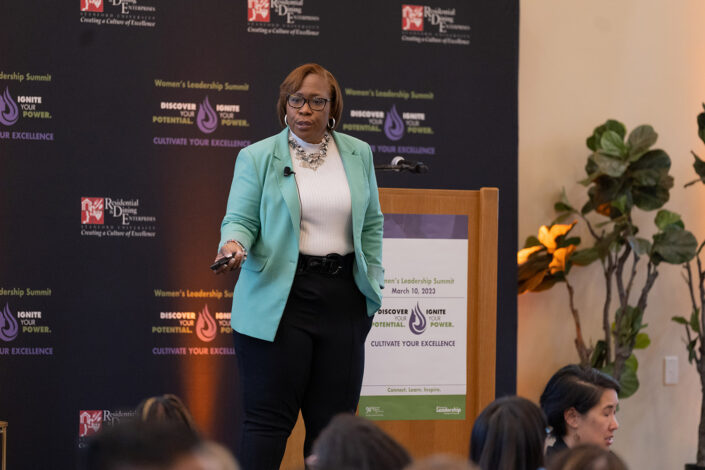
DeAngela Burns-Wallace gives the opening keynote, speaking on leading through empowerment. (Image credit: Karen Spicer)
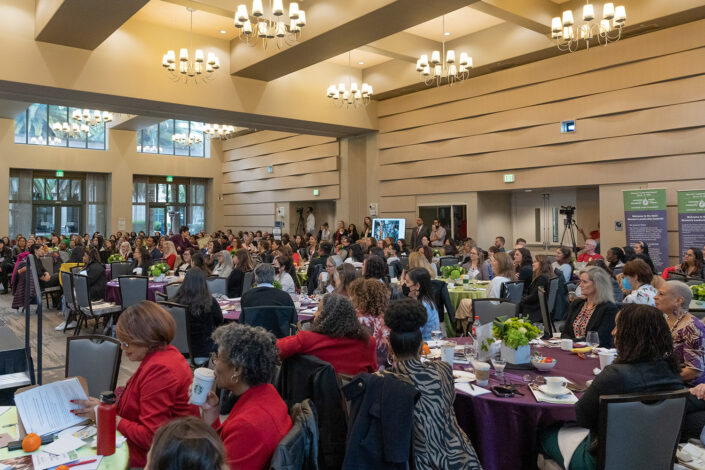
Summit attendees focus on speaker presentations. (Image credit: Karen Spicer)
Leading through empowerment
In her keynote address, DeAngela Burns-Wallace, alumna and member of the Stanford Board of Trustees, highlighted skills of successful leaders.
“Leadership is not about titles – it is about action, acknowledgment, and accountability for yourself and for your team,” said Burns-Wallace. Her presentation emphasized leading through empowerment and the importance of soft skills such as empathy and vulnerability, patience, humility, generosity, and creativity.
“The way we, as leaders, were able to get through an [unprecedented] thing like the pandemic was because of our teams, and the work and the investment,” she said. “When we lead to empower, it is the thing that makes the core difference.”
Lessons from lived experience
In a panel discussion moderated by Everett, called “Diversity, Equity, Inclusion, and Belonging: The Value of Inclusive Leadership,” Provost Persis Drell; Patrick Dunkley, vice provost for institutional equity, access, and community; and Ayodele Thomas, associate vice president for diversity, equity, inclusion, and belonging in University Human Resources, shared authentic and sobering lived experiences that illuminated the imperative – for Stanford and other workplaces – of achieving DEIB objectives. They also offered advice for leaders on creating environments that are equitable and inclusive.
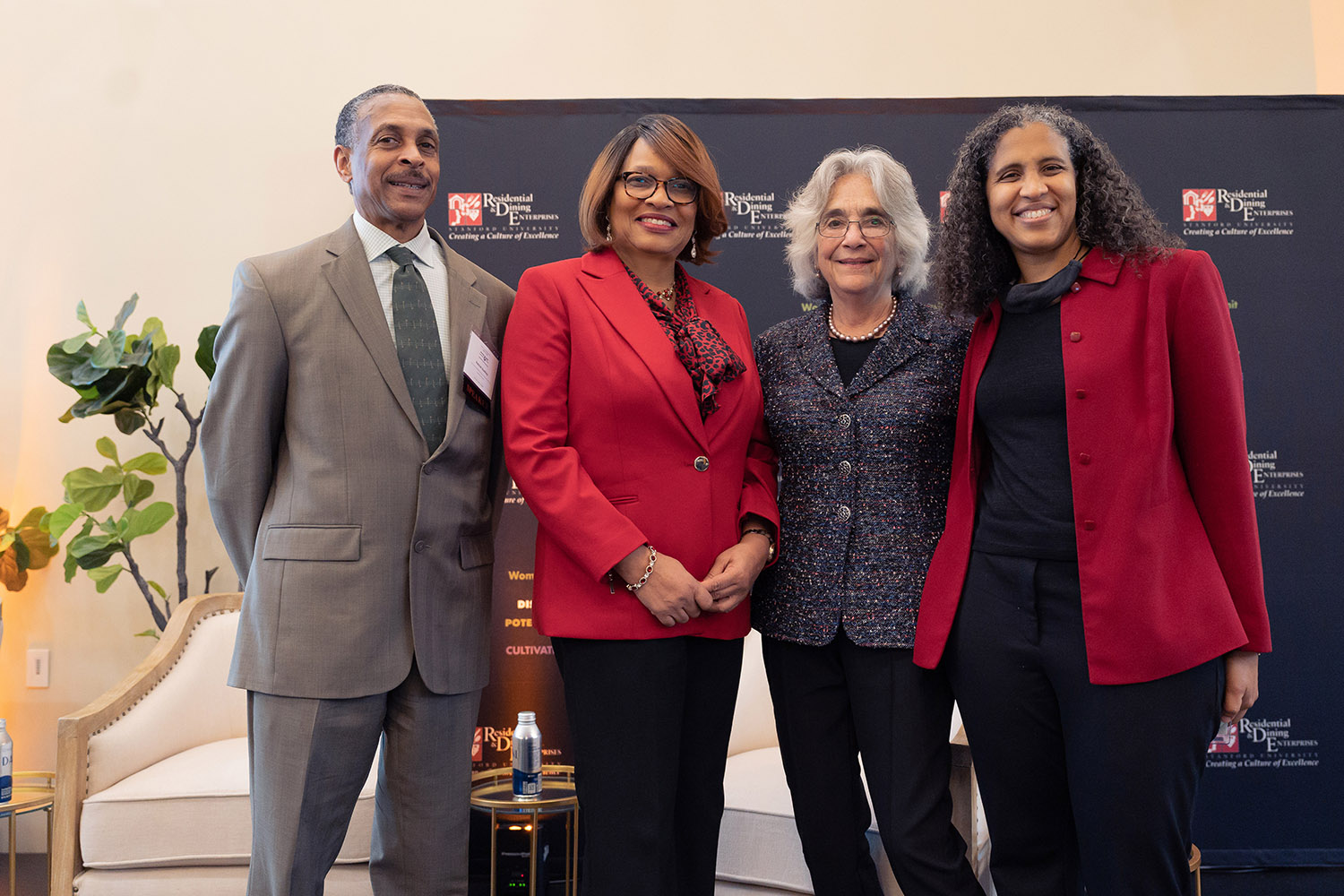
DEIB leaders Patrick Dunkley, Shirley Everett, Provost Persis Drell, Ayodele Thomas. (Image credit: Karen Spicer)
“Leadership for the future is inclusive leadership, because the future is diverse and the leaders who will lead … are going to have a very different set of backgrounds, they’re going to look different, and they’re going to present differently,” said Drell. “Preparing ourselves for the future, to be outstanding … as an institution, we have to embrace inclusive leadership and recognize that’s what’s going to lead us to the future.”
Dunkley focused on Stanford’s continuing DEIB journey. “I look out on this audience and I have to say I have tremendous pride in what I see. When we talk about diversity, equity, inclusion, and belonging on our campus, we have this aspirational vision of what it looks like. We have a long, long way to go. We have a lot of hard work ahead of us, and yet I see this, and this inspires me, you inspire me.”
Taking time to slow down and reflect is an important aspect of DEIB work for Thomas, and having spaces in which to do that is vital. “For so many leaders here on this campus and everywhere else, we spend so much of our time doing for others. A day like this where we’re stopping, we’re focusing, and we’re thinking about what we do, how we do it, and who we want to be … helps to inspire us, to connect us, and also to make sure that when we go back to our day-to-day work, we have some extra tools and some extra energy to help us carry on.”
Leaning in to joy
Two presenters addressed the toll that the challenges of leadership take, and the importance of a mindset that embraces joy and gratitude.
Kelly McGonigal, lecturer at the Graduate School of Business, spoke about managing stress. “How you think about stress matters. It affects everything from how your body responds to stress to how likely you are to learn from stressful experiences,” she said. People who have a more accepting view of stress, she said, are “more likely to problem solve, you’re more likely to ask other people for help, [and] you’re more likely to adapt to a new and changing reality. The most beneficial mindset toward stress seems to be one that accepts stress as part of life.” McGonigal also spoke about finding joy in movement, concluding her talk by leading the group in dance.
Sakena Young-Scaggs, senior associate dean for religious and spiritual life, delved into Sankofa, a concept taken from the Akan of West Africa that literally means “to go back and fetch it.”
“Walking Sankofa daily is about grounding yourself in your values, finding joy, and finding your own gratitude, daily gratitude,” said Young-Scaggs, adding that the practice can be different for everyone.
“The notion of Walking Sankofa as a leader is a journey. It means to bring all of who you are and all of who you’ve been influenced by in the past to your present,” she said. It means to “lean toward joy and lean toward a better life, toward a better being, toward constantly evaluating your values and your purpose.”
Leading from a place of truth
Former Assistant Vice Provost Jan Barker-Alexander, now the executive associate vice president of diversity and inclusion at Louisiana State University, led a panel discussion called “Perception, Reality, and the Truth: Navigating Work and Life While Protecting Your Soul” that included Faith Kazmi, interim assistant vice provost for inclusion and community and dean for community engagement, and Jeanette Smith-Laws, director of operations and student unions.

Jan Barker-Alexander, Faith Kazmi, and Jeanette Smith-Laws spoke about being true to yourself and the importance of a supportive community of people who see you and believe in you. Smith-Laws shared her own struggles with imposter syndrome. (Image credit: Alice Pyo)
Smith-Laws impressed upon the attendees the importance of surrounding oneself with a supportive community of people who see you, believe in your potential, and lift you up. Barker-Alexander continued the theme of letting others in. “I’m someone that leads with vulnerability. As women we are often taught that you can never be vulnerable in any space,” said Barker-Alexander. She spoke about personally opening up, “especially to other women, to let them know, ‘yes, I know that I may come across as strong and always together, but hey, I’m a hot mess just like everybody else.’”
Other topics addressed during the summit were the healing power of art, self-empowerment, disability as part of diversity, financial planning, building resilient communities, the language of leadership, finding your voice, and more.
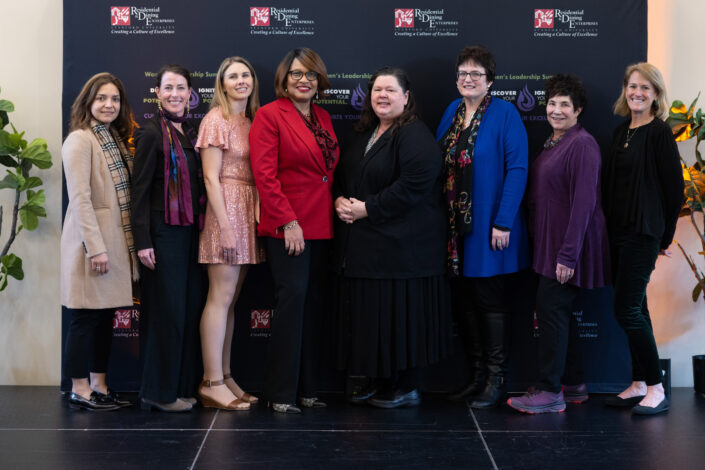
WLDP Council with founder Shirley Everett (fourth from left), from left: Rosa Barbosa, Michelle Ihrig, Michelle Lomeli, Cyndi McCollister, Simone Ferber, Amanda Gotthold, Suzanne Rose Bennett. Council members not pictured: Rosemary Delia, Debbie Main, Michelle Radisich, Marii Saucedo. (Image credit: Karen Spicer)
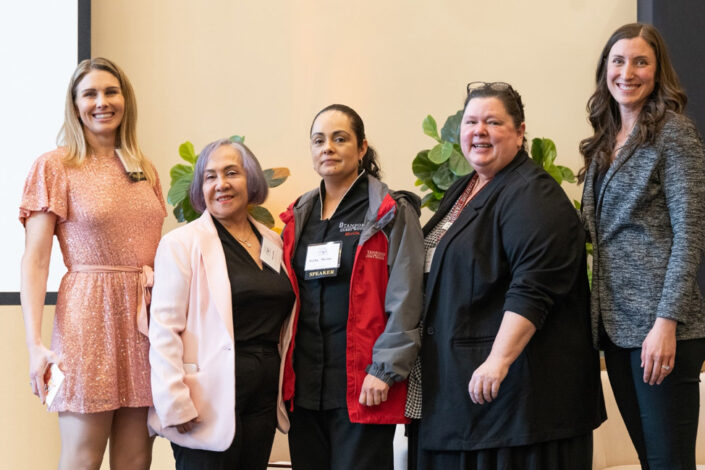
The “Lead with Purpose, Ignite Your Power!” panel highlighted opportunities for personal and professional development available through the Women’s Leadership Development Program. Panelists from left: Michelle Lomeli, Maria Castillo, Mirilla Farias, Cyndi McCollister, and moderator Jackie Bertoldo. (Image credit: Karen Spicer)
To encourage student attendance, R&DE provided several scholarships for undergraduate and graduate students to participate. One of the things that resonated most about the day for undergraduate Mary Lee was the idea of women empowering each other.
“As a first-year Stanford student, I really wanted to learn more about how to develop my leadership skills and how I can apply it to the rest of my career at Stanford and beyond. I really like the aspect of learning how to communicate with one another, empowering each other, and seeing how your network of skills can weave in and be integrated.”
At the conclusion of Everett’s closing remarks, attendees rose in a standing ovation, reflecting the impact of a day of programming that was both practical and deeply personal.
